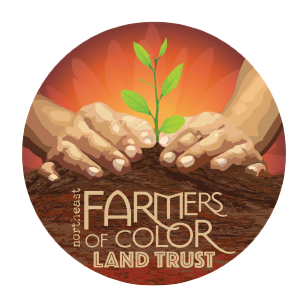Ubuntu Farms
The land laying fallow, waiting for the next steward.
Terra (Farmer Pirates Cooperative), Stephanie (NEFOC LT Executive Director), and Kondolo Makongo (Providence Farm Collective farmer) during a farm visit.
Ubuntu (fka Common Roots) Farm Project
Common Roots Farm, located in Buffalo’s Broadway Fillmore district, is a key player in addressing food apartheid in a low-income area with limited access to healthy food. Established in 2012, the farm practices sustainable, low-till farming and produces fruits, vegetables, herbs, and grapes. It also houses infrastructure like cold storage and irrigation systems. The current owners, who are also members of Farmer Pirates Compost Cooperative, are transitioning out of farm operations and seeking new stewards to take over the land, prioritizing Indigenous reciprocity and community food sovereignty.
Regenerating the soil of Buffalo’s East Side.
Goals and Vision
The farm’s near-term goal is to provide a New American or Black farmer with access to healthy, productive farmland in their community. Long-term, the vision is to create a community-owned, cooperative food system that supports regenerative farming in urban and rural hubs. By acquiring additional lots for bioremediation and farming, the project seeks to build a sustainable, circular economy in Buffalo's food apartheid zone.
NEFOC Land Trust and Partnerships
The Northeast Farmers of Color (NEFOC) Land Trust is working in partnership with Buffalo Go Green and Providence Farm Collective to transfer the land into community hands. NEFOC’s model centers on Reciprocity, ensuring that the land is held in trust for Black, Indigenous, Latinx, and Asian farmers in a manner that honors Indigenous sovereignty. The land will be managed with a focus on regenerative farming, cultural exchange, and climate resilience. NEFOC is overseeing the legal transfer of the land and farm operation, while Buffalo Go Green acts as a fiscal sponsor, handling expenses such as taxes and property management.
The purchase of Common Roots Farm is a pivotal moment for Buffalo, particularly in light of the city’s recent designation as a "climate haven." As Buffalo prepares to welcome populations displaced by climate change, securing access to land, food, and economic resources is essential. However, this farm purchase goes beyond climate adaptation — it addresses systemic inequalities in the food system, particularly for Buffalo’s BIPOC communities, while responding to the devastating impact of the 2022 Tops Massacre on the East Side.
BIPOC Food Sovereignty and Economic Empowerment
Buffalo Food System community activist and founder of Buffalo Freedom Gardens visiting the farm in May 2023.
The acquisition of Common Roots Farm represents a significant step toward BIPOC, community-driven food sovereignty. In Buffalo’s Broadway Fillmore district — a historically disenfranchised area and a "food apartheid" zone — access to fresh, healthy food is scarce, and BIPOC residents face ongoing marginalization. The transfer of the farm into community ownership via the Northeast Farmers of Color (NEFOC) Land Trust ensures that Black, Indigenous, and New American farmers can steward the land, grow their own food, and lead efforts to reclaim control over local food systems. This model fosters economic empowerment through cooperative farming and regenerative agriculture, breaking the cycle of disinvestment in these communities.
HEALING the Legacy of the 2022 Tops Massacre
The 2022 Tops Massacre, a white supremacist attack that targeted the only grocery store on Buffalo’s East Side, deepened an already dire food crisis. The tragedy exposed the fragility of the local food system, particularly in neighborhoods where BIPOC residents had few options for obtaining healthy, affordable food. Common Roots Farm presents a vital opportunity to rebuild trust, access, and control over food production in this hard-hit area. By empowering the community to grow its own food, the farm contributes to healing and resilience in the wake of this violence, restoring agency to those who have been disenfranchised.
Climate Resilience and Regenerative Farming
As Buffalo rises to meet the challenges of climate change, the farm will also play a key role in building climate resilience through regenerative farming practices. Techniques such as low-till agriculture, bioremediation, and ecosystem restoration not only enhance soil health and carbon sequestration but also prepare the community to withstand future climate disruptions. This positions Buffalo as a leader in creating a sustainable, equitable food system that meets both the environmental and social justice needs of its residents.
A Vision for Community and Justice
Through collaboration with NEFOC, Buffalo Go Green, and Providence Farm Collective, the purchase of Common Roots Farm embodies a long-term vision of food justice, land reparations, and community-led change. It transforms the narrative of food apartheid into one of food sovereignty, where BIPOC farmers and community members lead the way in building a self-sustaining, equitable food economy. By addressing the immediate impacts of food insecurity and laying the groundwork for a regenerative future, this project offers a blueprint for what a truly just, resilient Buffalo can be — a city that not only serves as a climate refuge but also as a model of healing, empowerment, and transformation.





